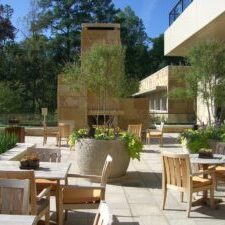
Big updates coming to Wake County driven by the tourism industry
August 8th, 2023
Happy Saturday, thanks for joining us. Study after study ranks the Raleigh region among the fastest-growing metro areas in the country.
This week, the Centennial Authority, which owns PNC Arena, and Gale Force Holdings – the parent company for the Carolina Hurricanes – piled onto the mountain of signals that the area’s headiest days are still to come.
Raleigh mayor Mary-Ann Baldwin described the plans for PNC Arena and its surrounding acreage as the biggest economic development project in the city’s history.
It also marks an inflection point in the vibe that defines a metro. The Triangle isn’t the scrappy understudy any longer: It’s vaulted onto the main stage, and people are flocking to the show.
***
A $300 million facelift for PNC Arena.
An $800 million mixed-use development, including a sportsbook, restaurants, and bars.
100,000 square feet of residential.
150,000 square feet of office space.
A 150-room hotel.
A 4,000-seat music venue.
A 20-year lease extension with no relocation option for the Carolina Hurricanes, a perennial Stanley Cup contender.
And all of it wrapped into one massive deal that we’re told will not cost taxpayers not an extra dime.
It’s a big bet – or a statement of confidence – on the Triangle’s future. The mood out there is growth – population, businesses, buildings, and prestige. What the region looks like in 20 years is bounded only by the limits of one’s imagination.
People want to come to the area – and the area wants them to be here.
Contrast the ethos of some northern cities – a hard grit, a certain pride in simply enduring – with the optimism and spirit that now defines the Triangle, and it’s not hard to see why.
For 20 years, the Triangle has been “up-and-coming.” But at some point – maybe it was this week’s news, or maybe the Apple announcement – the Triangle broke through the “keep an eye on them” stage and entered “we need to do what they’re doing.”
And what is the Triangle doing? It’s building a destination for companies, talent, and families to make money and enjoy a better life while doing it.
Deals like the PNC Arena redevelopment are one example of how.
The only taxpayer-funded portion of the project is the $300 million arena renovation. In effect, Wake County will take out a loan to fund the project and currently plans to repay it with a dedicated revenue stream from the 6% occupancy tax and 1% prepared food and beverage tax that exists now.
In the 1990s, the General Assembly authorized local governments to levy those taxes provided they use the revenue only for tourism-related projects.
The $300 million, then, requires no new taxes – only an allocation of existing revenues. In exchange, the area will benefit from a renovated arena (which taxpayers indirectly own anyway) plus nearly $1 billion (or more) in development. Oh, and the Hurricanes will pay rent and property taxes.
Compare the arrangement to another major sports facility in Minneapolis, Minnesota. The NFL’s Viking stadium is just seven years old in a city of comparable population to Raleigh.
There, state government in 2016 agreed to contribute nearly half of the $1 billion price tag from public funding sources. Since then, eight million visitors have attended more than 1,000 events, according to the Minnesota Sports Facilities Authority.
It should come as no surprise then, that just this summer the office of Minnesota Management and Budget announced that the state paid off $377 million in bond debt for the Viking’s U.S. Bank Stadium, a full 20 years earlier than anticipated.
Indeed, just as notable as this week’s PNC Arena announcement is what was absent from the scene: Union bosses juicing the price; politicians mobilizing NIMBYs; sideline cynics chirping, “Good luck with the permits!”
It’s just easier.
Financing structures are thought about in advance and then implemented faithfully. Most political leaders, at least on economic development, row in the same direction. A similar story played out in Charlotte for the convention center expansion.
As the Triangle Business Journal’s lead learned, it’s unwise to underestimate the southern hospitality that draws tourism to our capital city.
North Carolina’s metro growth has so far been executed about as well as can be expected. Yes, housing supply remains a problem, and traffic congestion requires constant improvements.
But on the whole, smart fiscal policy – either embraced by local governments or required by state lawmakers – has made North Carolina the envy of the country.
Recent Articles
When Prayers are Heard, Answers Come: Finding Peace in Times of Crisis
From the Desk of Chuck Fuller “Our prayers, sir, were heard, and they were graciously answered” Many years ago, I led a task force responding to a series of tornados that devastated parts of eastern North Carolina. In our early discussions, we debated how many people needed to be impacted for us to implement a…
Read MorePassenger rail’s future in North Carolina
Thank you for joining us this Saturday morning. America once led the world in train travel. Routes spanned the continent and most people had easy access to a train station. But trains gave way to cars and planes, and by the 1960s privately owned train companies were bleeding revenue. In 1970, Congress passed and President Richard Nixon…
Read MoreThe Golden LEAF Foundation and North Carolina
Thank you for joining us this Saturday morning. Today we’re diving into one of the most impactful North Carolina organizations of the past 25 years: Goldean LEAF (“LEAF” stands for long-term economic advancement foundation)The nonprofit has largely flown under the radar for the past decade. That lack of public attention or controversy should be seen…
Read More
